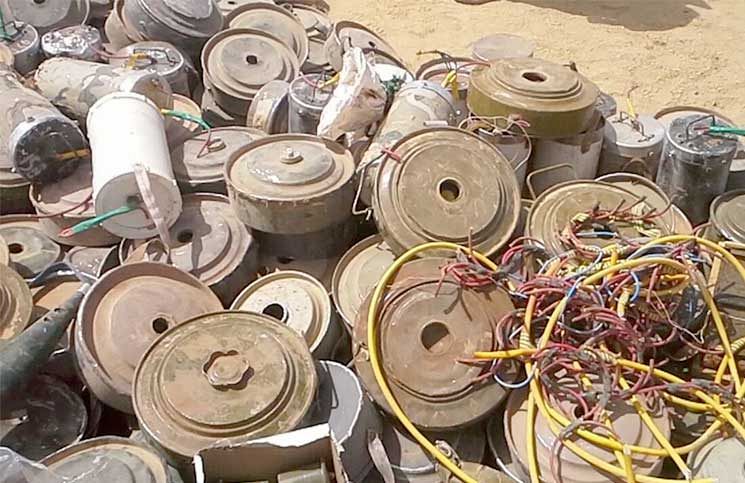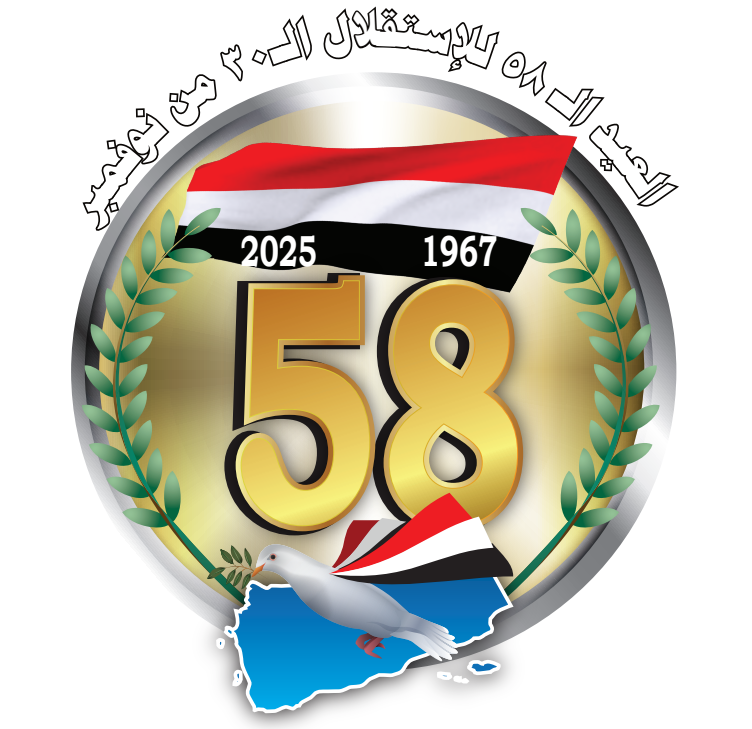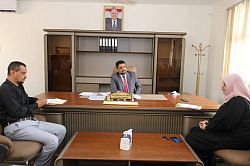
Minister of Technical Education Discusses Development of Vocational Education System with UNESCO Regional Center
Minister of Technical Education and Vocational Training Dr. Anwar al-Mahri met Tuesday with the National Coordinator of the UNESCO Regional Center for Quality and Excellence in Education Dr. Amjad Samir.
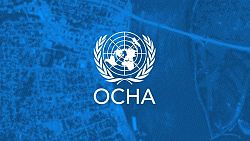
OCHA: Regional Escalation Directly Impacting Humanitarian Conditions in Gaza and the West Bank
United Nations Office for the Coordination of Humanitarian Affairs has warned that ongoing regional escalation is directly worsening the humanitarian situation in Gaza and the West Bank.
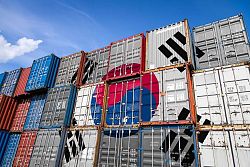
Korea large companies' exports rise 10 percent
Large companies' exports in South Korea rose approximately 10 percent year-on-year in the fourth quarter of last year, driven by increased global demand for semiconductors.

Saudi League: Al-Nassr, Al-Ettifaq and Neom Secure Victories Over Al-Ittihad, Damac and Al-Riyadh
Al-Nassr defeated its guest Al-Ittihad 2–0 in the match that brought them together at Al-Awwal Park Stadium in Riyadh, as part of the 21st round of the Saudi Professional League.
Last Update: ،
2026/03/04
Time
12:01:49
Latest News:
 SPRDY signs agreement to implement agricultural value chain project in 3 governorates
SPRDY signs agreement to implement agricultural value chain project in 3 governorates
 Minister of Agriculture Discusses with UNDP Interventions in Agricultural, Fisheries Sectors
Minister of Agriculture Discusses with UNDP Interventions in Agricultural, Fisheries Sectors
 Prime Minister urges escalating efforts to control crimes targeting public funds
Prime Minister urges escalating efforts to control crimes targeting public funds
 Minister of Culture, Tourism Discusses Support for Peace Efforts in Yemen with Berghof Foundation President ..
Minister of Culture, Tourism Discusses Support for Peace Efforts in Yemen with Berghof Foundation President ..
 Minister of Finance Discusses Enhancing Economic, Development Cooperation with French Ambassador
Minister of Finance Discusses Enhancing Economic, Development Cooperation with French Ambassador
Latest News:
 SPRDY signs agreement to implement agricultural value chain project in 3 governorates
SPRDY signs agreement to implement agricultural value chain project in 3 governorates
 Minister of Agriculture Discusses with UNDP Interventions in Agricultural, Fisheries Sectors
Minister of Agriculture Discusses with UNDP Interventions in Agricultural, Fisheries Sectors
 Prime Minister urges escalating efforts to control crimes targeting public funds
Prime Minister urges escalating efforts to control crimes targeting public funds
 Minister of Culture, Tourism Discusses Support for Peace Efforts in Yemen with Berghof Foundation President ..
Minister of Culture, Tourism Discusses Support for Peace Efforts in Yemen with Berghof Foundation President ..
 Minister of Finance Discusses Enhancing Economic, Development Cooperation with French Ambassador
Minister of Finance Discusses Enhancing Economic, Development Cooperation with French Ambassador
Mine Planting..Houthi Crimes against Yemeni People
[19/06/2018 09:47]
Riyadh - Saba
Hardly a day passes without the news of the injury or death of a Yemeni citizen due to mines planted by the Houthi militias after their successive losses against the progress of the legitimate forces supported by Arab coalition. Yemen has become one of the most affected countries of mine planting disaster since the end of the World War II, with a total of half a million mines planted by the militias in the Yemeni cities.
This huge amount of landmines constitutes a sustainable threat to civilian lives, compounded by the Houthi militias' deliberate, indiscriminate and heavy planting of internationally banned mines in the areas where they expelled from, even in homes, roads, and public facilities.
The mines types the Houthis plant varies. Some of them are handmade in the form of rocks if the area is mountainous and in the form of sand clusters, as well as other known mines of all kinds.
The Houthi militias deliberately plant mines and IEDs randomly in the streets, houses, farms of the areas which they are expelled from without taking into account the civilian, children, youth, and the elderly.
According to Local and international human right reports, the Houthi militias planted more than half a million mines in liberated Yemeni provinces, including internationally banned mines that killed hundreds of civilians and caused thousands of permanent disabilities to others. Every day, the damages of Yemenis are doubled and civilians paid the ultimate price. The Houthis have mined land and sea, which deprived farmers and fishermen of practicing their daily work through committing the most heinous crimes of war by outrageous violation of humanitarian law. There are a number of international agreements that regulate or prohibit the use of such landmines and explosive remnants of war.
These agreements are part of international humanitarian law aimed at reducing the effects of armed conflict on humanitarian grounds, including the Anti-Personnel Mine Ban Convention "the 1997 Ottawa Convention" which came into effect in March 1999. In March 2007, 153 countries have already agreed to the terms of the convention or acceded to it. The treaty imposed a total ban on anti-personnel mines after negotiations led by strong and unusual coalition involved a number of governments, UN, and international humanitarian organizations through a network known as (The international Campaign to Ban Landmines). The convention signatories are committed not to use, develop, or produce antipersonnel landmines, and to destroy - within four years - all mine stockpiles and to remove - within ten years - all planed mines.
In return, King Salman Humanitarian Aid And Relief Center continues the implementation of its projects to help Yemeni people to get rid of the Houthi mines and their catastrophic consequences, including the project to support the physical rehabilitation Centers carried out by the international Committee of the Red Cross (ICRC) with more that 10 million dollars.
King Salman Humanitarian Aid and Relief Center pays special attention to the landmines victims of innocent civilians. In addition to medical and therapeutic assistance, the Center provides a project of mine risk educational sessions and psychological support services for children and affected families in order to save the lives of Yemenis, especially children under 5, pregnant and nursing mothers, from the risks of death fields left by the Houthis and the followers of the ousted leader Ali Abdullah Saleh in every area they controlled before being liberated by the National Army and the Popular Resistance Forces with the assistance of the Saudi-led Arab Coalition Forces to support the legitimacy.
Key words:
internationally - Saba Hardly - implementation - rehabilitation - indiscriminate - international - organizations - psychological - antipersonnel - According - Minister of Technical Education Discusses Development of Vocational Education System with UNESCO Regional Center
Minister of Technical Education Discusses Development of Vocational Education System with UNESCO Regional Center  SPRDY signs agreement to implement agricultural value chain project in 3 governorates
SPRDY signs agreement to implement agricultural value chain project in 3 governorates Minister of Agriculture Discusses with UNDP Interventions in Agricultural, Fisheries Sectors
Minister of Agriculture Discusses with UNDP Interventions in Agricultural, Fisheries Sectors Minister of Culture, Tourism Discusses Support for Peace Efforts in Yemen with Berghof Foundation President
Minister of Culture, Tourism Discusses Support for Peace Efforts in Yemen with Berghof Foundation President  Minister of Finance Discusses Enhancing Economic, Development Cooperation with French Ambassador
Minister of Finance Discusses Enhancing Economic, Development Cooperation with French Ambassador  Foreign Ministry Denounces Iran’s Attack on U.S. Embassy in Riyadh
Foreign Ministry Denounces Iran’s Attack on U.S. Embassy in Riyadh Yemen participates in Global Ministerial Conference on Tourism in Berlin
Yemen participates in Global Ministerial Conference on Tourism in Berlin "MASAM" removes 1765 of Houthis-laid landmines in a week
"MASAM" removes 1765 of Houthis-laid landmines in a week Prime Minister receives message from his Maltese counterpart
Prime Minister receives message from his Maltese counterpart Planning Minister Discusses Intervention Plans and Future Cooperation with UNDP
Planning Minister Discusses Intervention Plans and Future Cooperation with UNDP